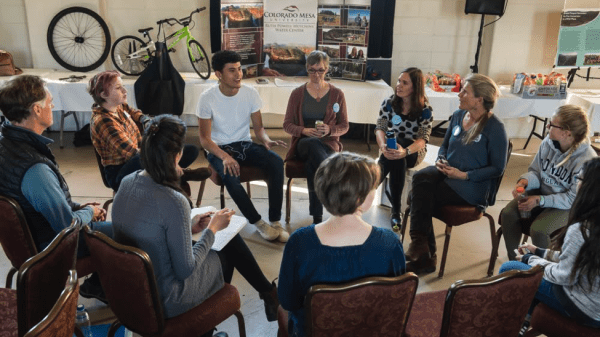In Favor of Mixing the Ages: Students Take the Lead on Wicked Water Issues

"...the young, must ask the questions that we would never think to ask, but enough trust must be re-established so that the elders will be permitted to work with them on the answers." — Margaret Mead
Recently, I spent one Thursday at a conference composed of a miscellany of water-minded adult professionals and enthusiastic middle school, high school, and undergraduate students. The 2018 Healthy Rivers Youth Water Summit, held in Carbondale, Colorado marked the second year of a gathering designed for and in collaboration with students. The goal was to gather learners of all ages to discuss water issues they care about. This is the first event I have attended where young people and adult community members were invited to engage one-another on equal footing. It was an eye-opening experience for me, and one that made me wonder how co-learning of this kind could be brought to other topics and educational settings.
The Healthy Rivers Youth Water Summit was a day-long event that included student presentations on their water-related research, two adult keynote speakers, an “opportunity expo” for current student summer work and leadership opportunities, and student-determined break-out sessions for more in-depth discussion of topics from the day. The event was a culmination of planning, learning, and deliberation of the Youth Water Leadership Program’s Summit Leader Team, in which I played a part as a community leader. Like the Summit it coordinated, the leadership program was composed of mix of students and adult community members.
In my current role as a research and education coordinator for the Aspen Global Change Institute, my interactions with the student community are usually limited to one-way education, such as leading field trips or providing a guest lecture. As a participant in this program, I got the chance to see how students think about water issues and solving societal challenges in general. I came away impressed by their interest in these topics and their thoughtful approaches to them, as well as inspired by their enthusiasm and verve. I also saw how the students benefited from being allowed to act as the educators for a change. At the Healthy Rivers Youth Water Summit, students were able to experience a format of communication similar to professional conferences. They seemed to gain confidence from presenting their ideas to a group that included both their peers and participants of other ages. The question and answer sessions following each presentation confirmed for the students that their topics mattered and also offered a chance for community members to share feedback or additional information from their own experiences. Throughout my participation, it became clear to me that opportunities such as this helped both the students and the adults involved grow in their understanding of the topic and in their recognition of different perspectives.
Both the Summit and the serving on the Summit Leader Team reminded me that educational opportunities that give agency to the students allow for more enriched learning for both the students and the teachers interacting with them, and I strongly encourage other educators, both formal and informal, to consider ways to create opportunities for mixed-age education in the future--I know I will!
Anyone interested in learning more about youth summit programs may be interested in the following resources:
- Youth Water Leadership Program Website
- Youth Climate Summit Toolkit
- University of Idaho’s Confluence Project Youth Water Summit
Youth water summits across the country additionally share social media with the hashtag #YouthWaterSummit.
